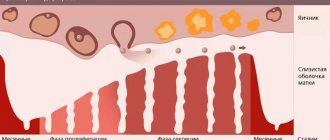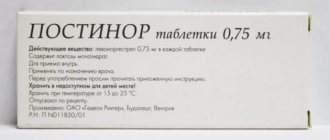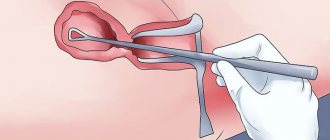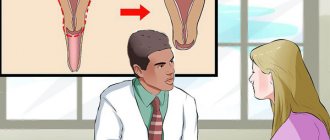With and without breastfeeding
Prolactin is a hormone produced by the pituitary gland that affects milk production and blocks the functioning of eggs. This condition is called postpartum amenorrhea, and its duration depends on the characteristics of the body and hormonal levels, as well as on the feeding of the baby.
The frequency of infant feeding is especially affected. If the break is less than three hours, then “these days” will begin much faster.
There are several options for the development of events:
- If there is no breastfeeding, then menstruation begins in the eighth to tenth week after delivery.
- Resumption after a month is very rare. Most often it is the accumulation of lochia, inflammation and heavy bleeding, which is mistaken for “these days”, but in fact it is a problem that requires treatment in the hospital.
- The first menstruation after childbirth during breastfeeding, when resumption occurs after 120 days, is also considered normal; the main reasons are the transition to a mixed diet or a complete refusal of breast milk.
- The return of “those days” 150-250 days after the birth of the child is the most likely scenario. In the sixth month of life, the baby needs breast milk less and switches to mixed or ready-made food. At this time, prolactin is almost not produced and ovarian stimulation begins.
- Arrival after a year and a half happens less often, but the reason for this is periodic, rare breastfeeding of the baby. Despite minimal prolactin production, egg maturation becomes more difficult.
Read also: Elevated leukocytes in the blood after childbirth: causes and normal level
Exceptions to the rules
However, there are certain exceptions to this rule, like many others. First of all, those ladies who refuse breastfeeding for various reasons quickly get their first period after childbirth. In this case, hormonal changes occur faster and the cycle returns within 5 weeks.
But it also happens that a woman, even while practicing breastfeeding, may discover a few months after giving birth that she is pregnant again. Menstruation cannot begin immediately after 30 days. After all, while the healing of the endometrium continues after the removal of the placenta, its new growth cannot be observed. The only thing worth understanding is that if after 30 days the lochia does not begin to decrease in volume and does not lose the intensity of its color, the matter is not okay. In such a situation, doctors will check the young mother for blood clots remaining in the uterine cavity. This situation is considered very dangerous, because such accumulations begin to rot and become the cause of severe inflammatory processes in the woman’s body. If, against the background of increasing volume and intensity of bloody discharge, a woman develops:
- Increased body temperature (and the numbers can be quite high)
- Stomach ache
- Weakness
You should contact specialists for help as soon as possible. After all, such a situation can end very badly. Treatment, as a rule, takes some time and can be quite painful. But at the same time, you cannot refuse it, because there is a direct threat to the life and health of the mother.
In this case, the menstrual cycle, restored after 3-4 months, is considered a variant of the norm. Even if it manifests itself during breastfeeding. In this situation, doctors simply state the fact that the woman’s pituitary gland is working well and the individual recovery time for the body is quite reduced.
First Time Features
After cessation of lactation, the body needs about three months to completely rebuild and recover. An irregular cycle before pregnancy entails instability after, and when your period comes after childbirth while breastfeeding, it becomes a complete surprise. If there are problems, the doctor may prescribe a course of hormones to stabilize the condition.
Women note that after the birth of children, the critical days are not so painful, because the pelvic organs shift and the curvature of the uterus disappears. Also, the duration of bleeding decreases by a couple of days. It is difficult to say what the critical days will be after the birth of children. It all depends on the level of prolactin and the woman’s hormonal background. If the delay lasts more than three weeks, it is better to consult a gynecologist; the matter sometimes lies in pathology.
The onset of menstruation after childbirth: features
In most cases, after childbirth, the menstrual cycle becomes regular fairly quickly. Only in the first couple of months, critical days may come ahead of schedule or be slightly delayed.
There are many rumors about the menstrual cycle and the speed of its recovery. You can often hear that the restoration of menstruation after childbirth is directly dependent on the way in which the child was born. Actually this is not true. The onset of menstruation has nothing to do with whether the birth was natural or a caesarean section.
After the onset of menstruation, many women note that menstruation has become less painful, and discomfort is no longer felt. This phenomenon is physiologically explainable. Typically, pain during menstruation occurs due to the curvature of the uterus , which prevents the normal outflow of blood. After childbirth, the arrangement of organs in the abdominal cavity changes slightly, and the bend straightens. In this regard, pain during menstrual periods disappears in the future.
Very often, menstruation is confused with discharge called lochia . They are a mixture of blood clots and mucus. The cause of lochia lies in damage to the lining of the uterus. The first few days after birth they are abundant and have a bright red color. After a week, the lochia acquire a brownish tint, and their number noticeably decreases. Gradually they become more and more scarce. This is due to the fact that the lining of the uterus is healing. Lochia can be released for 6-8 weeks. After this they stop.
After childbirth, during breastfeeding and in the absence of menstruation, conception can occur. It is known that the maturation of the egg and its release from the ovaries begins approximately two weeks before bleeding. A few days before and after ovulation there is a chance of getting pregnant.
The onset of menstruation after childbirth is not a sign that the female body is ready for the next pregnancy. It takes a couple of years to fully recover. It is advisable to plan for the next child after this period. Therefore, before your period starts, you need to take care of contraception.
Situations when you should consult a doctor
After the birth of the child and with artificial feeding, your periods did not come? This fact may indicate the presence of diseases of the genitourinary system. After stopping breastfeeding, periods may also be absent.
The reason for this is postpartum pathologies, endometriosis, hormonal disorders, tumors, and inflammation of the ovaries. If there are no critical days, you should definitely consult a doctor to prevent unwanted consequences.
You should also contact a medical professional if your periods are very heavy . If, with heavy discharge, more than 1 pad is required for 2 hours, then this should be regarded as bleeding. Symptoms such as pain, unpleasant odor and dark tint of blood should also be alarming.
If 2-3 months after the start of the critical days the menstrual cycle has not recovered , then this is already a deviation. In such a situation, you should ask a gynecologist for advice. The cause may be hormonal imbalances.
Sometimes women who have become mothers complain of worsening PMS. You will find answers to the questions: why does this happen and how you can deal with the problem in the video at the end of the article.
Personal hygiene when restoring menstruation after childbirth
After the birth of a child, special attention should be paid to personal hygiene, because during this period the female body requires a more attentive and careful attitude.
Until the menstrual cycle resumes, it is not recommended to use pads with absorbent mesh and tampons. These remedies are not suitable for lochia. During them, it is best to use pads with a smooth surface. They need to be changed every 3-4 hours.
After childbirth, frequent toileting of the genitals is recommended. It is better to avoid “intimate” gels at this time. You can use regular baby soap.
Sexual intercourse is not recommended for 6 weeks after birth. Unprotected sex is unacceptable, because infections can get into the uterus.
In conclusion, it is worth emphasizing that the moment when menstruation begins after childbirth does not occur at the same time for different women. The duration of the recovery process is purely individual. Personal hygiene plays a huge role after childbirth. At this time, you need to be very careful about your body in order to prevent infections from entering the uterus and the occurrence of any inflammatory processes.
We recommend reading: Is it possible to treat teeth during pregnancy and breastfeeding?
When everything should be back to normal
There are no exact dates when menstruation is restored after the birth of children during breastfeeding, it all depends on the condition of the body. Sometimes this happens within two weeks, sometimes after two years, and this will be the norm. The main thing is not to confuse critical days and postpartum complications. Most women note that the cycle is restored after 12-16 months.
The main factor that influences the onset is the frequency of breastfeeding.
If a mother constantly puts her baby to her breast, the production of prolactin begins, which delays the onset of ovulation. If you start introducing formulas and breastfeeding less often, then the functioning of the eggs will resume faster. With frequent breastfeeding in the second year of life, recovery will take even longer.
At first, when menstruation begins, the frequency will be inconsistent, and the discharge will be rare, almost colorless - you should not be afraid of this. This is influenced by the remainder of the hormone prolactin, which is why there is even an interruption and the appearance of blood for several days. Sometimes a delay occurs when the mother begins to put the baby to the breast during the period of teething or intensive growth. Most often it is influenced by hormonal levels, the condition of the woman’s body, and the characteristics of breastfeeding.
It is important to understand that the absence of a cycle means preservation of eggs and, therefore, prolongation of youth.
Our faithful companion is the menstrual cycle
A regular menstrual cycle is an important sign of a woman's good health. Typically, girls begin menstruation at the age of 10-12 years; on average, establishing a regular cycle takes several months. The length of the cycle is different for everyone, it depends on the individual characteristics of the body, but it should be noted that the norm is from 28 to 35 days.
From time to time, we women really want to take a break from monthly “guests,” and yet their absence means organic or physiological problems in the body, or pregnancy. In both cases, you need to contact a gynecologist to monitor your health.
To our common joy, we still manage to take a break from menstruation. After conception, during pregnancy and after birth, women experience a period during which they can forget about menstruation. This is due to the fact that incredible changes occur in a woman’s body during pregnancy and during childbirth. The entire hormonal background is redrawn.
The hormone prolactin, which is responsible for the production of colostrum and milk, begins to be actively produced immediately after childbirth; it suppresses ovulation, that is, it normally prevents the onset of a new pregnancy while the baby is breastfeeding. Thus, nature takes care of the emerging offspring, devoting all the maternal forces to nursing the existing baby and preventing the conception of a new one.
Is it possible to get pregnant?
Absence of menstruation and feeding with mother's milk is one of the ways to prevent pregnancy, but only in the first six months and in the absence of discharge for the first 55 days after the birth of the child. To avoid getting pregnant during breastfeeding, you should not refuse breast milk even once a day, use pacifiers, and the interval between meals cannot be more than six hours.
If you do not adhere to these rules, then even the fact that you do not have periods is not a guarantee that the woman will not become pregnant again.
After all, ovulation comes first, and only then menstruation.
Read also Swelling of the legs after childbirth: causes and treatment
Menstruation during artificial feeding and after cesarean section
Things are different if milk does not come in after childbirth for some reason, or a woman specifically interrupts lactation with the help of drugs. In this case, in the absence of the production of lactogenic hormones, the menstrual cycle is restored after cleansing the uterus (about 6-8 weeks after the birth of the baby).
If a caesarean section was performed, normally the process of cycle rehabilitation proceeds in the same way as after a natural birth. First, the uterus must cleanse itself, then lactogenic amenorrhea occurs if the woman is breastfeeding.
When milk production decreases or stops, the cycle is restored. If a young mother does not breastfeed her baby, menstruation will come earlier.
Effect on milk
Women are often afraid that when menstruation occurs and if you are breastfeeding, the taste of the milk may deteriorate and the baby will refuse to breastfeed. But there is no clear evidence of this, and the taste of milk changes constantly and depends on the products the mother eats. The only thing that may happen is a decrease in the amount of milk during ovulation, but this period will last for a couple of days.
It is important not to give up breastfeeding even during “these days,” as this affects the development and growth of the baby. Although for the first time when menstruation occurs after childbirth, some inconveniences may occur, for example:
- mastitis;
- bubbles;
- swelling.
Infrequent periods
You should not expect that immediately after stabilization of the ovaries, the frequency will become normal, as before. Only after three or four cycles will a certain pattern be established. If the gap between cycles is too long, it is better to consult a doctor, because this may be a sign of health problems. Among them:
- inflammatory and infectious issues;
- hormonal disbalance;
- repeat pregnancy.
If you have just switched from breastfeeding to formula, your periods will not return immediately; it will take about two months. A longer delay is also a cause for concern.
You should not use the absence of menstruation as a method of contraception, because the body recovers after childbirth for about two years and you can expect anything.
When do breastfeeding mothers start their periods?
A breastfeeding woman is especially curious to know how long after giving birth her periods begin. Mothers who have established breastfeeding can forget about menstruation for at least a year. This is a minor, but very pleasant bonus.
The hormone that supports lactation, prolactin, suppresses the maturation of the egg. To denote this phenomenon in medicine, the term “lactational amenorrhea” is used, i.e. the absence of regular menstruation during the lactation period.
It is worth noting that the absence of menstruation does not mean that a nursing mother is reliably protected from pregnancy. The female hormonal system is a very delicate and multifaceted structure. Even the slightest drop in prolactin levels can cause the ovaries to begin functioning again, and the egg will still be fertilized. Therefore, if pregnancy is not desired in the near future, it is necessary to think about contraceptive methods.
It often happens that the first menstruation after childbirth begins only after breastfeeding is completed. But only if the prolactin level remains stably at a fairly high level. Mothers who choose a style of feeding their baby on demand rather than on a schedule can most often forget about menstruation until the baby is weaned. Nightly latching also keeps prolactin levels high.
We invite you to watch a video on the topic: “Is it possible to get pregnant during lactation.”
However, with the beginning of the active introduction of complementary foods or the transfer of the child to the general table, the number of feedings decreases and the level of prolactin decreases. And, perhaps, regular menstruation will not take long to arrive.
If mixed feeding (supplemental formula feeding) is practiced, then the prolactin level is unstable. Menstruation usually begins 3-4 months after birth.
When to see a doctor?
The process of stabilizing menstruation is individual, but there are situations when you should go to the hospital:
- If the baby was conceived artificially, and three months after birth, the woman’s period has not started.
- If several months have passed after the end of lactation, and the cycle has not been restored. Sometimes the reason lies in inflammation of the ovaries, endometriosis or hormonal disorders.
- If the discharge of blood is too abundant, it looks more like bleeding.
- If they have an unpleasant odor, this often indicates a reproductive system infection.
- Severe pain in the lower abdomen may indicate incomplete delivery of the placenta.
For any deviation, it is better to visit a gynecologist once again, because lack of treatment can lead to serious consequences.











